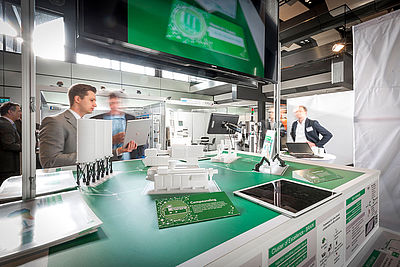IKV is represented with several sub-projects in the Excellence Cluster "Internet of Production", and is delighted not only with the result of the selection process but also with the appreciation of the high level of research at IKV. The "Internet of Production" cluster is based on the work of the Cluster of Excellence "Integrative Production Technology for High-Wage Countries" that has been in existence since 2006 and is now occupied with the digital transformation of production technology.
Over 25 institutes and research facilities and more than 80 scientists from the fields of production technology, informatics, material sciences and applied economics have been involved in the research to date. Jointly, they develop engineering methods and processes in order to bring together in the Internet of Production the data obtained during production, and thus make the data accessible and usable across different sectors.
Although large volumes of data are created in modern-day production technology, this data has until now been neither readily accessible nor linked to make it interpretable in such a way that knowledge can be generated from it. The Cluster of Excellence entitled "Internet of Production" pursues the vision of enabling a new level of cross-sectoral collaboration by making available semantically adequate and context-related data from development, production and use in real time and at optimum resolution. The utilisation of all relevant data promises a much improved forecasting capability and controllability of production processes and, in connection with machine learning, offers plenty of potential for production technology.
With the approval of three clusters, RWTH Aachen University has achieved another major success in its Excellence Strategy: Throughout Germany, 195 draft proposals were submitted to the German Research Foundation (DFG). 41 universities were subsequently requested to submit full proposals for a total of 88 draft proposals. 57 applications from 34 universities were finally approved. Only twelve German universities received approval for more than two clusters, which means that RWTH Aachen University has also attained a leading position in this comparison.
RWTH is now also preparing its application as an Excellence University. With three Excellence Clusters – two of its own and one in cooperation with the University of Cologne and the Rheinische Friedrich Wilhelms University of Bonn – the RWTH has a good starting position to also obtain approval here.
Background to the Excellence Initiative
The "Excellence Initiative of the federal and state governments for the funding of science and research at German universities", which supports research and training facilities that perform top-level research, was launched for the first time in 2005. The concept covered three funding lines: research schools, clusters of excellence and future concepts. These funding lines aimed to promote different areas of the scientific community. From 2019, the funding program will be continued in modified form under the name "Excellence Strategy", and will then cover only two funding lines: Clusters of excellence and Excellence Universities. The overall program is being funded from 2018 with a total of 533 million euros a year.
Through the clusters of excellence, internationally competitive areas of research are – in each case for a specific project – to be funded for a period of seven years. excellence clusters can also be tackled by groups of universities, thus encouraging scientific networking and interdisciplinary cooperation. Funds totalling around 385 million euros a year have been earmarked for such cluster of excellence projects.
The Excellence University funding line is based on successful clusters of excellence and ensures a lasting funding of the university or group of universities. One condition is the approval of at least two clusters of excellence at the same university. With university groups, at least three excellence clusters are required. For the funding of Excellence Universities, a sum of around 148 million euros will be allocated each year.

